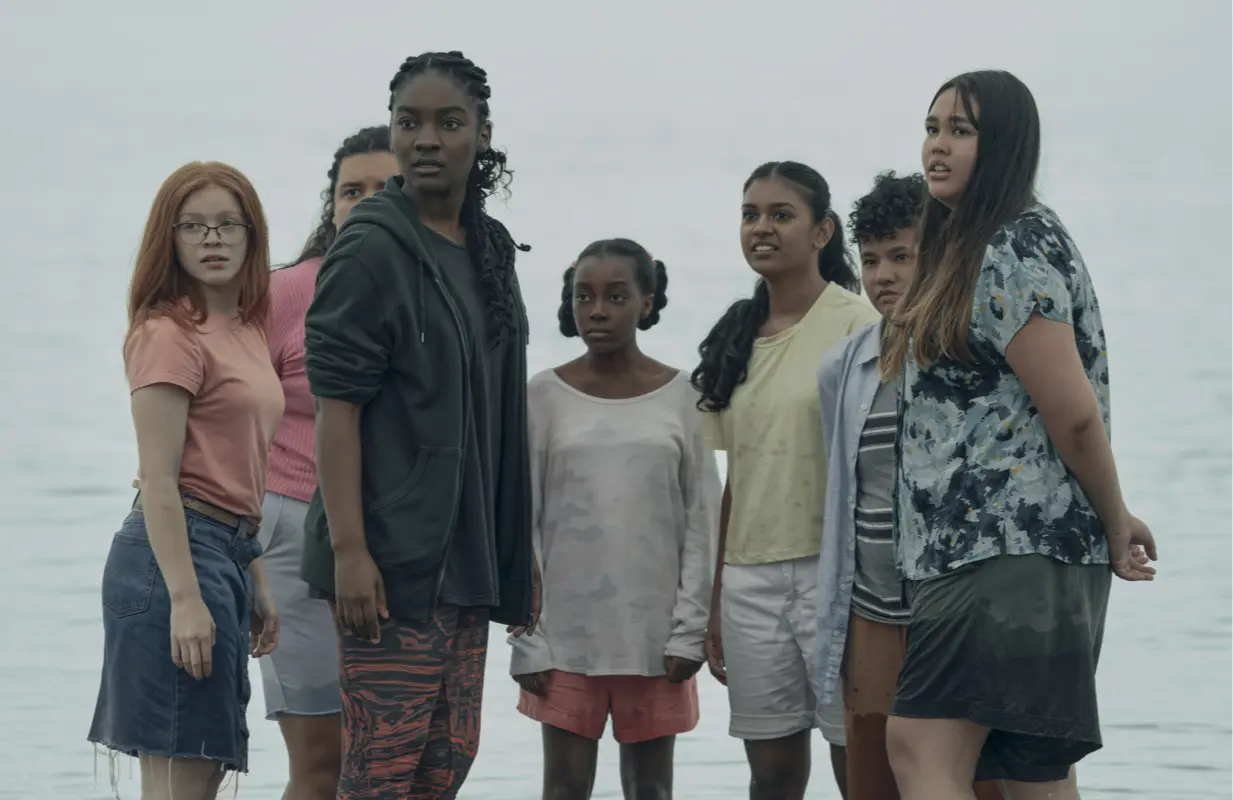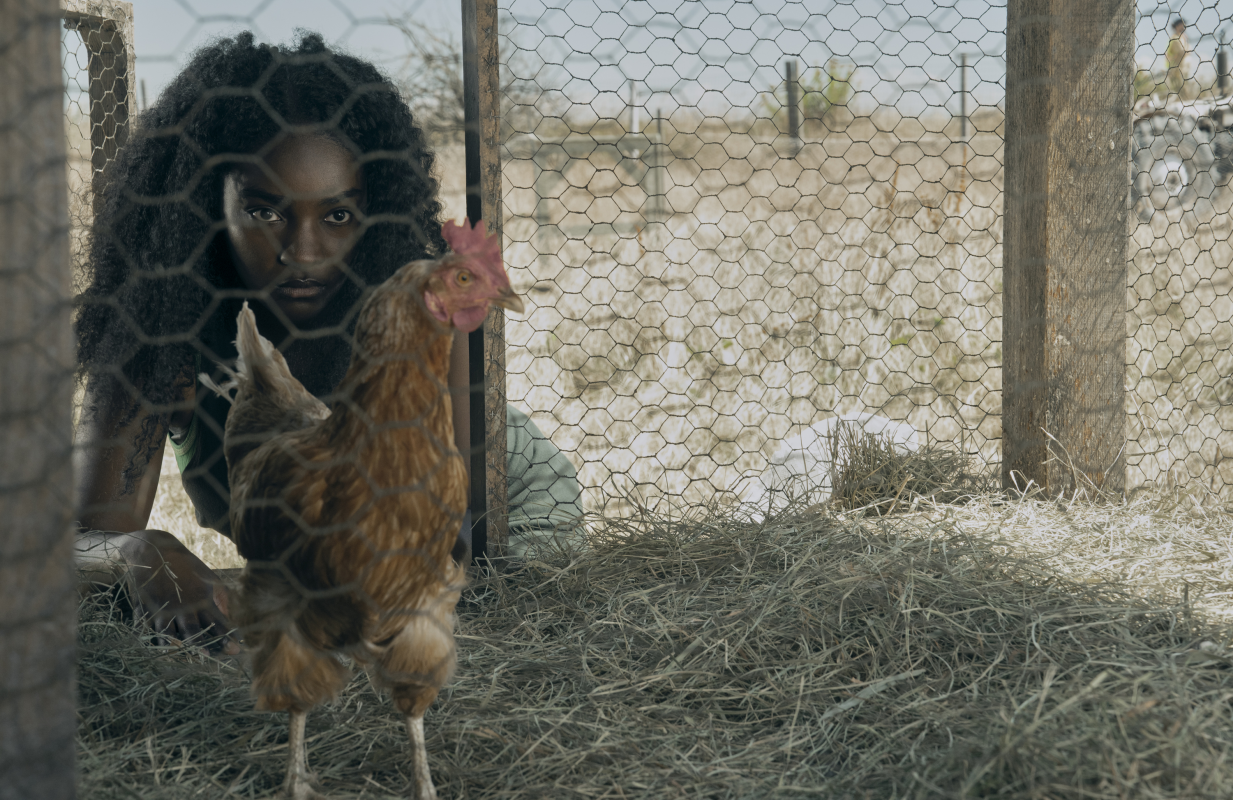Adina Porter Might Be the New Voice of God
-
 Eve (Halle Bush, foreground) and some of her followers on The Power (Photo: Katie Yu/Prime Video)
Eve (Halle Bush, foreground) and some of her followers on The Power (Photo: Katie Yu/Prime Video)The Power wouldn’t be the same without Adina Porter, and she doesn’t even appear on screen. She plays The Voice, a disembodied entity that speaks to Eve (Halle Bush), one of millions of teenage girls across the world who have developed the ability to shoot electricity out of their bodies. For other characters in Prime Video’s sci-fi epic, this new talent is a source of comedy, action, or political thrills. For Eve, it’s a pathway to revelation. Talking to The Voice, she begins to perceive herself as an instrument of God, and soon enough, she plants the seeds of a new religion. Porter’s performance helps make this journey tantalizing and potentially unsettling.
The key is her ambiguity. For the most part, The Power, which is adapted from Naomi Alderman's novel, succeeds by being direct. From the start, there's no question that teenage girls can create electricity: The series even identifies the biological process that makes it possible. These facts ground the show, and instead of a philosophical exploration of cosmic mysteries, it’s an almost practical examination of social upheaval. The major exception is The Voice. Though Eve and the audience certainly hear it, none of the other characters do. It’s an open question whether it’s a hallucination or as real as the lightning that comes from Eve’s hands.
Porter dives into the gray area. She almost purrs her lines, warmly contrasting the way that most of the adults in Eve’s life speak to her. She keeps that quality after Eve murders her abusive foster father, goes on the run, and finds herself at a convent that's taking in other runaway girls. When The Voice tells Eve she'll be safe with the nuns, there’s no urgency, only assurance. When she reminds Eve she can protect herself from danger, she sounds matter-of-fact. And in Episode 4, "The Day of the Girls," when The Voice suggests Eve should use her power to control the minds of the animals and people around her, she’s as soothing as the leader at a yoga retreat.
That’s when Porter’s steady timbre becomes harder to parse. There's no question The Voice has been good to Eve, both guiding her to the convent and helping her establish spiritual authority among the other girls there. But is The Voice's encouragement part of a long-game strategy to turn Eve into a weapon? Porter never puts a hard edge on her delivery that might read as “a villain growing impatient,” and she doesn’t overdo the flattery like a bad guy buttering up her henchwoman. The Voice’s motives are opaque, and that inscrutability makes her even more fascinating.
This complements the ambiguity about whether The Voice is actually there. Eve understands it as the voice of God, but if she's only imagining it, then she may be in thrall to a mental illness. That raises unpleasant questions about whether one person's aural fantasy can be another’s religious awakening.

On the other hand, if The Voice really is divine, then that would suit the show's larger themes about female agency. It would also thrust the series into an ongoing debate about who’s allowed to portray the Almighty. When Frances McDormand provided the voice of God on Prime Video’s Good Omens, thousands of people were outraged that a woman had been given the role. In a general denunciation of Kevin Smith’s film Dogma, The Catholic League singled out Alanis Morissette for portraying God, since she was “known for her nude videos and songs about oral sex.” Adina Porter is a woman who has starred in some of the bloodiest seasons of American Horror Story, so that alone courts controversy. But the events in “The Day of the Girls” are especially provocative. It’s not just that The Voice wants Eve to practice mind control, but that she sounds unperturbed when Eve accidentally kills a chicken while trying to master the skill. If The Voice really is God, then The Power imagines a world where God so favors women that She gives them Old Testament-style latitude to manipulate and kill. And again, because Porter’s performance doesn’t have any common markers of “villainy,” we can’t assume we know how the show wants us to feel about this.
The unknowability adds a provocative mystery to The Power’s new world order. While the show’s other stories move in a straight line, Eve and The Voice run circles around our desire for simple answers. It might be tempting to think overturning the patriarchy would be an uncomplicated victory for all of humankind, but Porter calmly reminds us that nothing is ever so simple.
New episodes of The Power stream Thursdays on Prime Video. Join the discussion about the show in our forums.
Mark Blankenship has been writing about arts and culture for twenty years, with bylines in The New York Times, Variety, Vulture, Fortune, and many others. You can hear him on the pop music podcast Mark and Sarah Talk About Songs.
TOPICS: The Power, Prime Video, Good Omens, Adina Porter, Alanis Morissette, Frances McDormand, Halle Bush